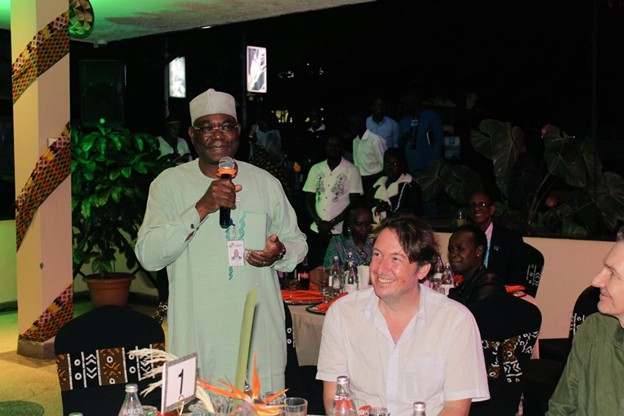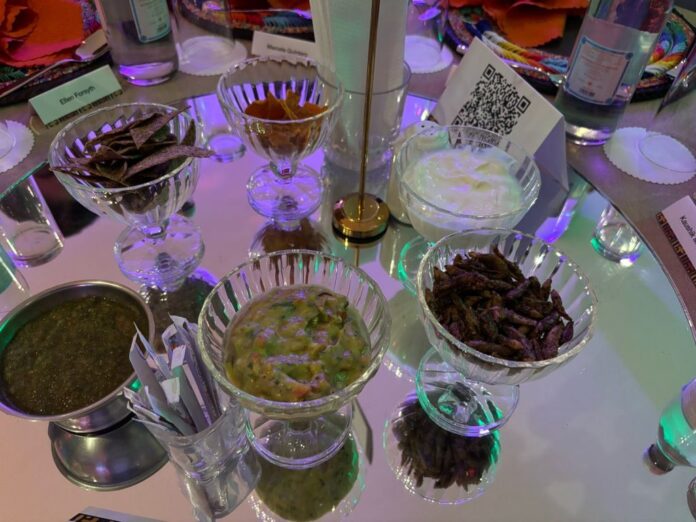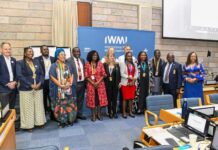|
Getting your Trinity Audio player ready...
|
Jackson Okata
Nairobi, Kenya: As climate change continues to threaten food security across Africa, scientists and policymakers are turning to an unconventional yet promising source of nutrition: insects. From protein-packed crickets to waste-reducing black soldier flies, edible insects are emerging as a sustainable, affordable, and nutrient-rich solution.
The International Centre of Insect Physiology and Ecology (ICIPE) is investing in research that could see these tiny creatures could soon become staples on dinner plates across the continent.
On April 8, 2025, ICIPE and the Alliance of Bioversity International and CIAT hosted “Biodiversity Bites: A Culinary Journey into Agricultural Research in Africa”—a dining experience held during CGIAR Science Week at ICIPE’s Nairobi campus. The event blended science with gastronomy to highlight cutting-edge innovations in agriculture aimed at tackling climate change, biodiversity loss, and hunger.
Dr. Abdou Tenkouano, Director General of ICIPE said insects are clean food.
“We are interfacing with insects for the betterment of people and the environment,” he said.
High in Nutrition, Low in Impact
According to ICIPE, globally, more than 2,000 insect species are consumed as food, with Africa home to over 500 edible varieties. Popular among them are grasshoppers, mopane caterpillars, and crickets, which are already part of traditional diets in several African countries.
Dr. Margaret Kababu of ICIPE’s Insects for Food, Feed and Other Uses (INSEFF) programme, underscored their nutritional potential.
“Insects offer up to 70% protein—surpassing beans and rivaling beef,” she said. “They are rich in iron, zinc, omega fatty acids, and contain bioactive compounds useful in pharmaceuticals.”
To overcome cultural hesitation, Dr Kababu called for processing insects into powders that can be added to everyday foods like porridge, bread, or even snacks, making them more acceptable to first-time consumers.
“Reluctance stems from ignorance. Close your eyes, taste, and you’ll come back for more,” she said.
Circular Solutions for Rich Soils
Beyond their nutritional value, insects are playing a transformative role in circular agriculture. Species like the black soldier fly are being harnessed to convert organic waste into high-quality animal feed and organic fertilizer.
Dr. Kababu explained that insect-based fertilizers have shown promising results across 25 different crops. “They improve soil health, boost yields, and offer a sustainable alternative to chemical inputs.”
ICIPE’s Insects for Food, Feed and Other Uses (INSEFF) programme, rooted in the “One Health” approach, focuses on the interconnected health of humans, animals, plants, and the environment. Its innovations address food and feed production, environmental cleanup, and even disease control.

The programme has seen mass-rearing technologies for edible insects, such as crickets, palm weevils, mealworms, and dung beetles, now being adopted by smallholder farmers.
It has also seen the production of high-value products such as insect oils, nutraceuticals, natural antimicrobials, and pest-control solutions derived from insect by-products like chitin and chitosan.
ICIPE says that research is also underway into the antimicrobial properties of insect-based compounds against drug-resistant bacteria, wound healing applications, and their role in improving livestock gut health.
Policy, Entrepreneurship, and the Path Ahead
For Africa to fully harness the potential of insects, enabling policies are critical. INSEFF is collaborating with regulatory agencies in Kenya, Uganda, and other countries to develop science-based standards for edible insects in both the food and feed sectors.
Over the past six years, the initiative has catalyzed a wave of entrepreneurship. In Kenya alone, eight major insect-based enterprises now produce over 2,200 metric tons of dry insect protein—equivalent to 4% of the country’s total demand for conventional animal feed protein.
“We grew up eating insects—now they are delicacies,” said Dr. Tenkouano. “Africa should not wait.”
With partnerships in over 61 countries across five continents, ICIPE is establishing Africa as a global hub for insect-based innovation and biodiversity-driven food systems.
“Insects are the heart of biodiversity,” Dr. Tenkouano concluded.
“Embracing them ensures food security, better health, and a greener planet.”














